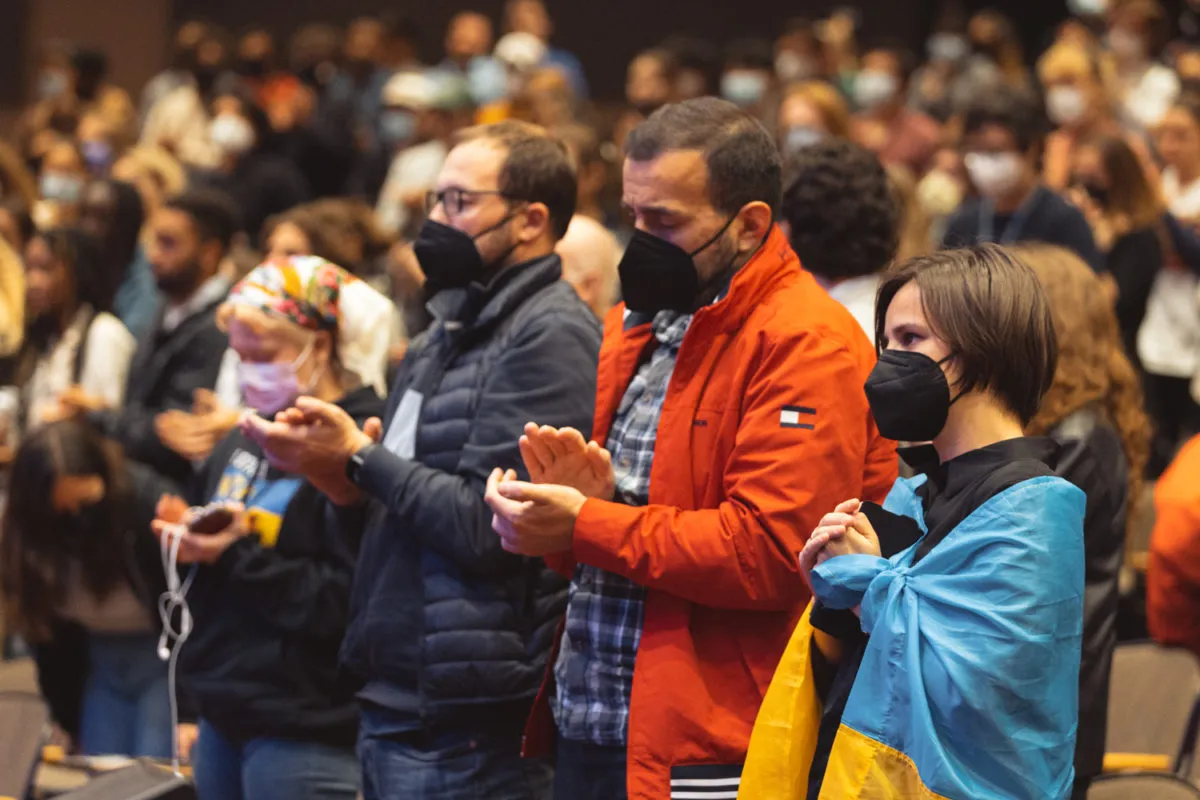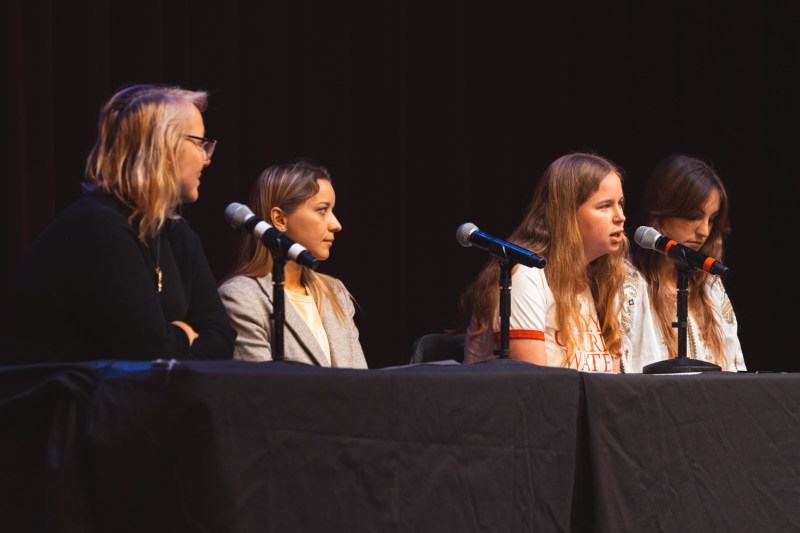Ukrainian students urged the Stanford community to take part in the fight against the Russian invasion at a Thursday “Invasion On Ukraine: Student Voices” panel hosted by Stanford in Government at Dinkelspiel Auditorium.
The panel began with a moment of silence to commemorate the lives that have already been lost in the war.
“Today, I called my mom [living in Ukraine] to check-in and today is her birthday, and the only thing that she told me was that she wishes for her family’s safety and for peace in Ukraine,” said Anastasiia Malenko ’23, one of the three student-panelists. Malenko is a news editor for The Daily.
Malenko, Kate Slunkova MBA ’22 and Catarina Buchatskiy ’23 were born and raised in different regions of Ukraine, ranging from Ukraine’s capital Kyiv to Cherkasy to Dnipro. All three student panelists have families currently residing in the country.
“Just 15 minutes before coming into this panel, all of us are watching news of the Zaporizhzhia nuclear power plant being shelled by the Russians,” Malenko said. “This could cause another huge nuclear disaster, the effects of which will spread farther than Ukrainian borders.”
The Zaporizhzhia nuclear power plant — the largest in Europe — went ablaze following an attack by Russian troops on Friday, according to Ukrainian officials. The fire has since been contained and extinguished, but the attacks have not ended.
Many Ukrainians have advocated for a “no-fly zone,” which would entail NATO countries protecting areas of Ukrainian airspace from Russian air forces. A political science major, Malenko expressed understanding toward the reservations political leaders have on imposing the “no-fly zone,” but she said “it is very difficult to come up with any of these arguments when my mom talks about it while she’s hiding from the bombs.”
Assistant professor of Slavic Languages and Cultures Yuliya Ilchuk, who moderated the panel, asked each panelist to recount their experiences on Feb. 23 — the day that Vladamir Putin declared war on Ukraine.
Malenko said she was in class as bombs began falling on Ukrainian cities. She recounted approaching her professor after class and saying “it started,” having previously talked to him about the possibility of invasion. “I couldn’t hold my tears in, so I broke down crying and so did he,” she said.
“I’ve been experiencing a very strong cognitive dissonance because life at Stanford just goes on,” she added. “It’s week nine and people are drowning in work but for me, time just stopped on Wednesday.”
Buchatskiy recalled having a gut feeling of worry as she waited for Putin’s nationwide press conference announcing Russia’s decision to initiate a “special military operation” in Ukraine. During dinner at 6 p.m. that night, she thought to herself, “maybe I should shower right now because he is going to declare war in 45 minutes and I won’t be able to have my life together after that,” she said.
Slunkova recounted being glued to her phone and receiving over 500 messages a day exposing the cruelty of the conflict via the instant messaging service Telegram.
“I don’t think that any war has been exposed in social media to the extent that this war has been and, it’s hard to say, but I feel that this is good because the world needs to know what is happening,” Slunkova said.

Malenko urged Western media to do a better job of representing the Ukrainian perspective on the war and related issues. “We’re asking for very basic things in the face of an invasion, in the face of civilians being killed every day,” she said.
During the conversation, Buchatskiy asked the audience how many of them had ever been to New York’s Museum of Modern Art. As hands throughout the auditorium rose, Buchatskiy said, “You are all victims of Russian propaganda.”
Buchatskiy referenced the museum’s Russian modernism exhibition, which features artists who, while presented as Russian, are “not only Ukrainians but Ukrainians who spoke out about their identities,” she said.
Malenko, Slunkova and Buchatskiy emphasized that Russian aggression against Ukraine is not new, and they urged audience members to educate themselves on this history.
Buchatskiy, who wore a vyshyvanka, said that her traditional Ukrainian attire has been heavily repressed for centuries. “My great grandmother had to burn all of her vyshyvankas,” she said, highlighting the repression that Ukrainians have faced due to Russian control for centuries prior to the most recent attacks.
Educational institutions such as Stanford play an important role in raising awareness about the war, according to the panelists. Slunkova said that if Stanford’s mission is to educate world leaders, then every member of the Stanford community should sound alarms about the ongoing war and take action.
“I encourage everyone who is here in this audience to remember that they are world leaders,” Slunkova said. “Not only leaders of their dorms or their clubs, or their community, and that ambition should be to restore peace in the whole world.”
Malenko added that “as people who go to a university whose motto is the wind of freedom blows, we should support freedom in Ukraine as much as we can.”
Malenko also expressed gratitude to the Stanford community for offering their support. She urged the audience to visit a website created by Ukrainians at Stanford that includes volunteer opportunities as well as lobbying efforts, informational sites and places to donate.
Before closing, Slunkova stressed the immediate need for action and community support.
“This is a beautiful place for you to start your worldwide leadership journey, so don’t wait for it,” Slunkova said. “Be a leader now. Organize your community. We need you — otherwise, Ukraine will be alone.”
